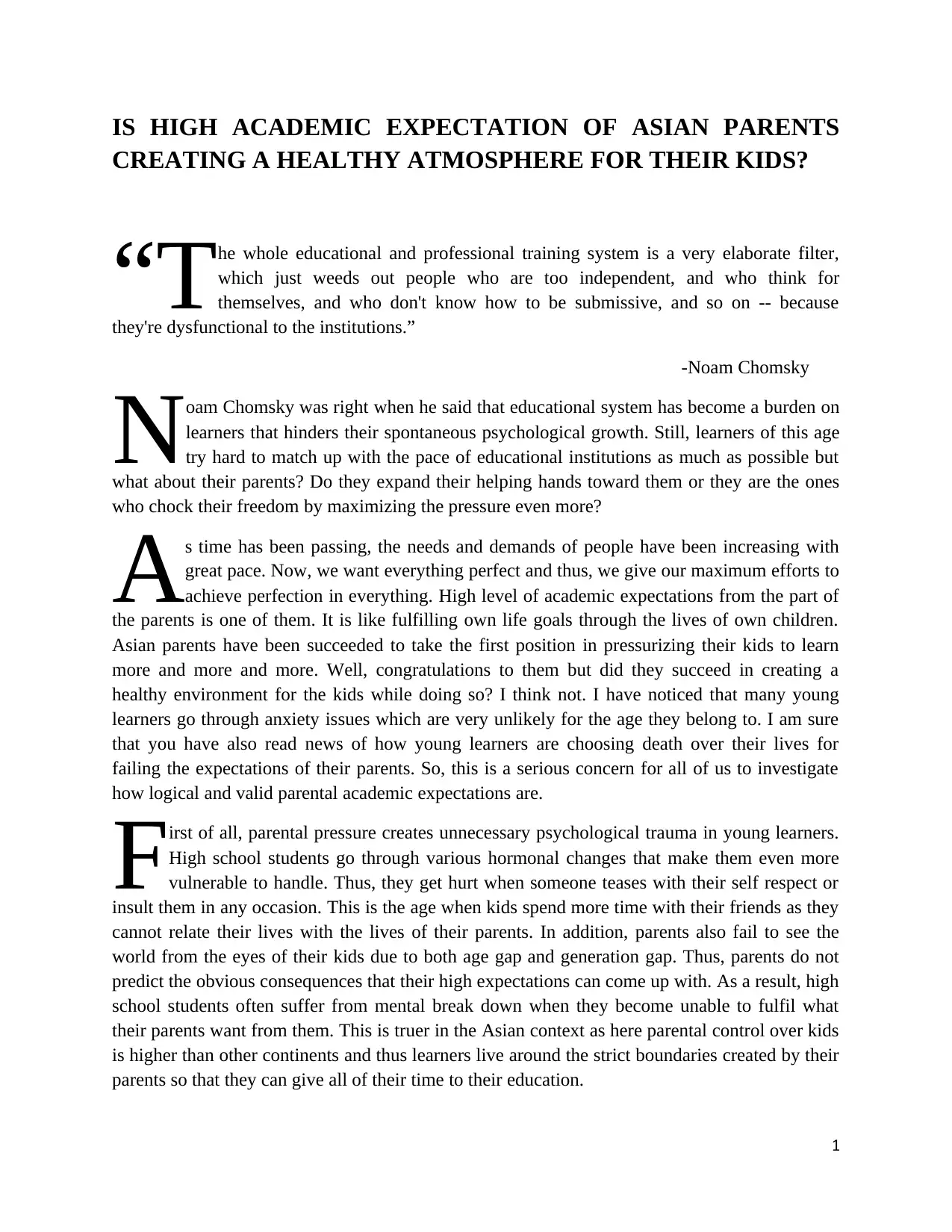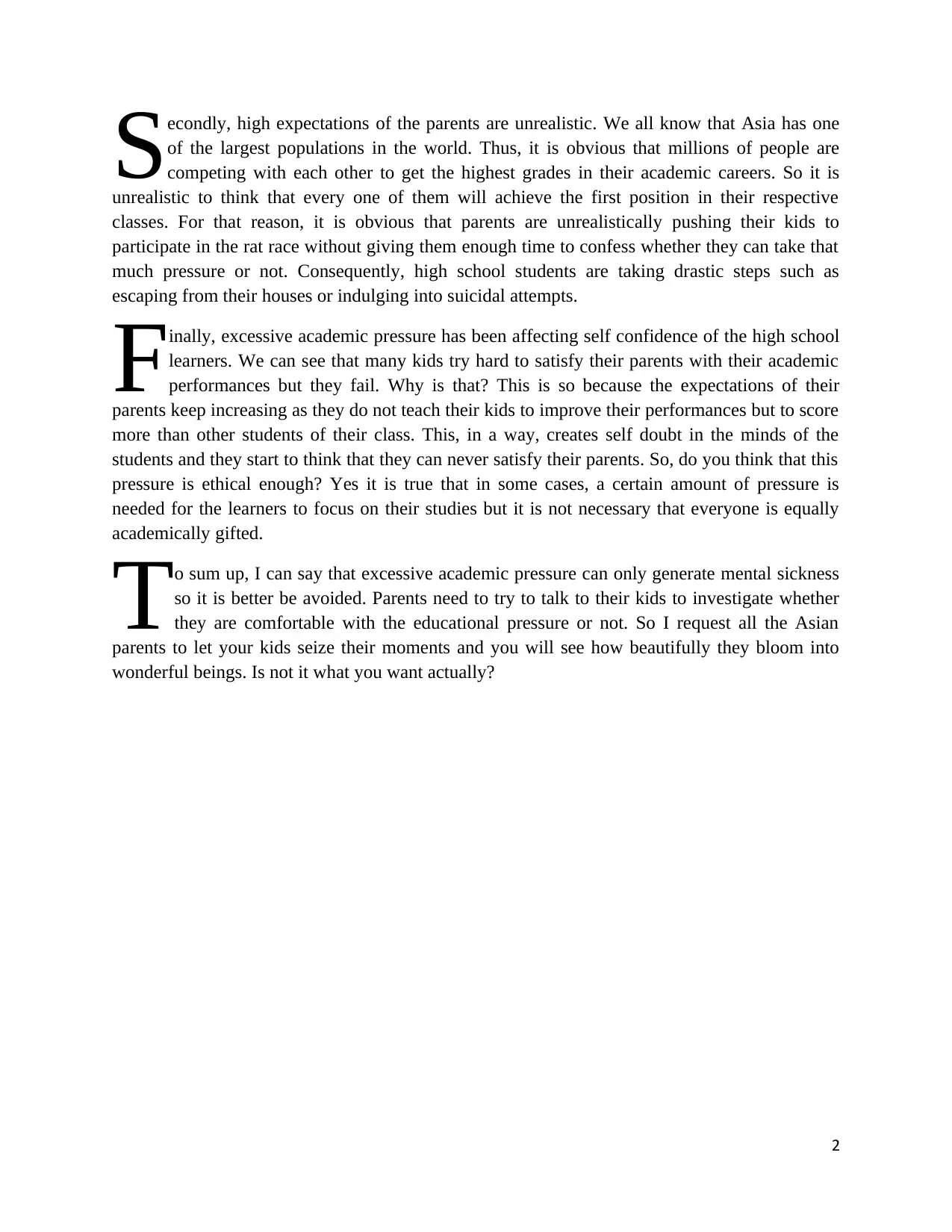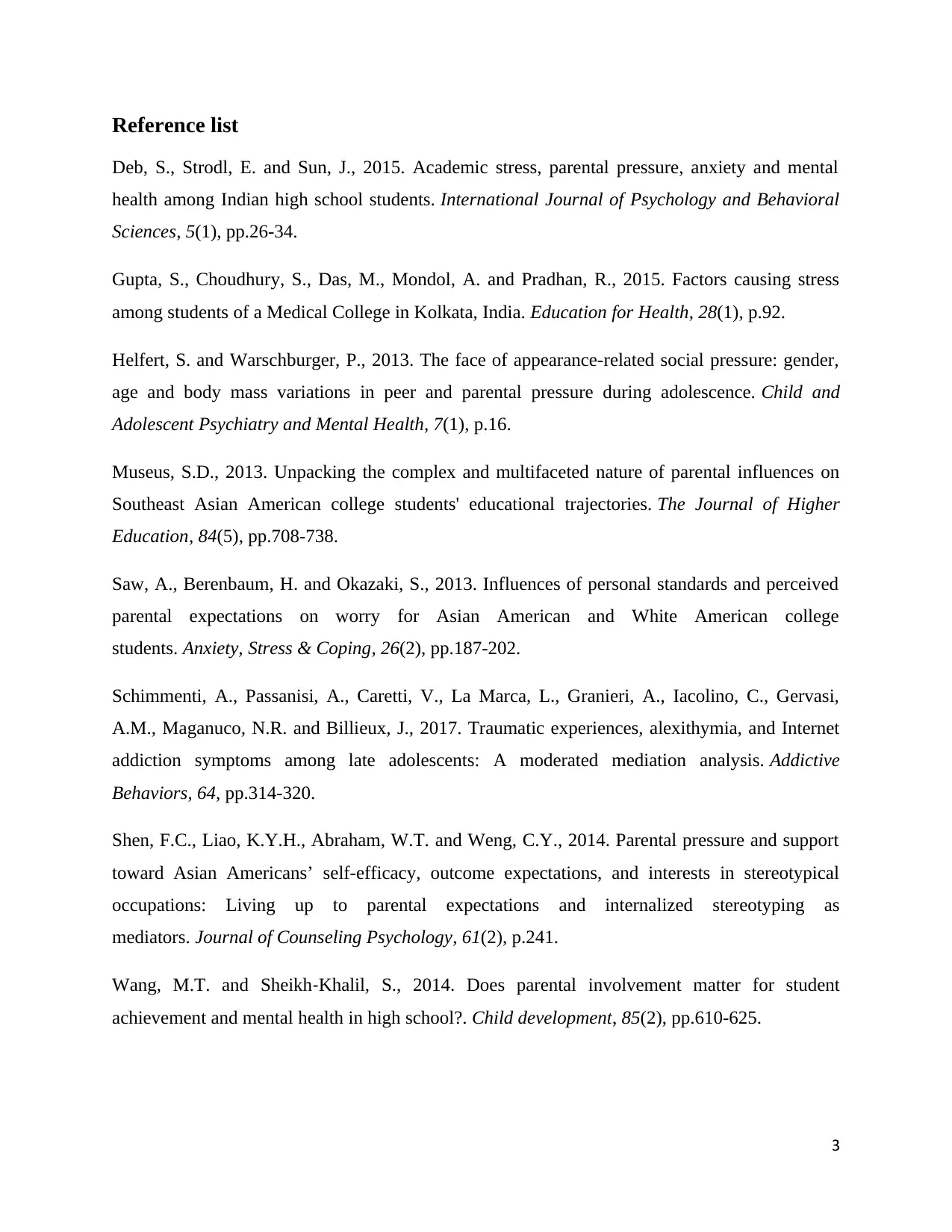The Effects of High Academic Expectations of Asian Parents on Kids
VerifiedAdded on 2023/04/22
|3
|1271
|304
Essay
AI Summary
This essay examines the effects of high academic expectations from Asian parents on their children's well-being. The author argues that excessive pressure leads to psychological trauma, unrealistic goals, and a decline in self-confidence among students. The essay highlights how parental pressure can contribute to anxiety and mental health issues in young learners. It also discusses the cultural context, noting that Asian parents often place a strong emphasis on academic achievement, sometimes leading to excessive pressure. The author concludes by advocating for a more balanced approach where parents consider their children's emotional and mental health alongside academic performance and encourages parents to communicate with their children to assess their comfort levels with academic demands, and to allow them to flourish.

IS HIGH ACADEMIC EXPECTATION OF ASIAN PARENTS
CREATING A HEALTHY ATMOSPHERE FOR THEIR KIDS?
he whole educational and professional training system is a very elaborate filter,
which just weeds out people who are too independent, and who think for
themselves, and who don't know how to be submissive, and so on -- because
they're dysfunctional to the institutions.”
“T -Noam Chomsky
oam Chomsky was right when he said that educational system has become a burden on
learners that hinders their spontaneous psychological growth. Still, learners of this age
try hard to match up with the pace of educational institutions as much as possible but
what about their parents? Do they expand their helping hands toward them or they are the ones
who chock their freedom by maximizing the pressure even more?
Ns time has been passing, the needs and demands of people have been increasing with
great pace. Now, we want everything perfect and thus, we give our maximum efforts to
achieve perfection in everything. High level of academic expectations from the part of
the parents is one of them. It is like fulfilling own life goals through the lives of own children.
Asian parents have been succeeded to take the first position in pressurizing their kids to learn
more and more and more. Well, congratulations to them but did they succeed in creating a
healthy environment for the kids while doing so? I think not. I have noticed that many young
learners go through anxiety issues which are very unlikely for the age they belong to. I am sure
that you have also read news of how young learners are choosing death over their lives for
failing the expectations of their parents. So, this is a serious concern for all of us to investigate
how logical and valid parental academic expectations are.
A
irst of all, parental pressure creates unnecessary psychological trauma in young learners.
High school students go through various hormonal changes that make them even more
vulnerable to handle. Thus, they get hurt when someone teases with their self respect or
insult them in any occasion. This is the age when kids spend more time with their friends as they
cannot relate their lives with the lives of their parents. In addition, parents also fail to see the
world from the eyes of their kids due to both age gap and generation gap. Thus, parents do not
predict the obvious consequences that their high expectations can come up with. As a result, high
school students often suffer from mental break down when they become unable to fulfil what
their parents want from them. This is truer in the Asian context as here parental control over kids
is higher than other continents and thus learners live around the strict boundaries created by their
parents so that they can give all of their time to their education.
F
1
CREATING A HEALTHY ATMOSPHERE FOR THEIR KIDS?
he whole educational and professional training system is a very elaborate filter,
which just weeds out people who are too independent, and who think for
themselves, and who don't know how to be submissive, and so on -- because
they're dysfunctional to the institutions.”
“T -Noam Chomsky
oam Chomsky was right when he said that educational system has become a burden on
learners that hinders their spontaneous psychological growth. Still, learners of this age
try hard to match up with the pace of educational institutions as much as possible but
what about their parents? Do they expand their helping hands toward them or they are the ones
who chock their freedom by maximizing the pressure even more?
Ns time has been passing, the needs and demands of people have been increasing with
great pace. Now, we want everything perfect and thus, we give our maximum efforts to
achieve perfection in everything. High level of academic expectations from the part of
the parents is one of them. It is like fulfilling own life goals through the lives of own children.
Asian parents have been succeeded to take the first position in pressurizing their kids to learn
more and more and more. Well, congratulations to them but did they succeed in creating a
healthy environment for the kids while doing so? I think not. I have noticed that many young
learners go through anxiety issues which are very unlikely for the age they belong to. I am sure
that you have also read news of how young learners are choosing death over their lives for
failing the expectations of their parents. So, this is a serious concern for all of us to investigate
how logical and valid parental academic expectations are.
A
irst of all, parental pressure creates unnecessary psychological trauma in young learners.
High school students go through various hormonal changes that make them even more
vulnerable to handle. Thus, they get hurt when someone teases with their self respect or
insult them in any occasion. This is the age when kids spend more time with their friends as they
cannot relate their lives with the lives of their parents. In addition, parents also fail to see the
world from the eyes of their kids due to both age gap and generation gap. Thus, parents do not
predict the obvious consequences that their high expectations can come up with. As a result, high
school students often suffer from mental break down when they become unable to fulfil what
their parents want from them. This is truer in the Asian context as here parental control over kids
is higher than other continents and thus learners live around the strict boundaries created by their
parents so that they can give all of their time to their education.
F
1
Paraphrase This Document
Need a fresh take? Get an instant paraphrase of this document with our AI Paraphraser

econdly, high expectations of the parents are unrealistic. We all know that Asia has one
of the largest populations in the world. Thus, it is obvious that millions of people are
competing with each other to get the highest grades in their academic careers. So it is
unrealistic to think that every one of them will achieve the first position in their respective
classes. For that reason, it is obvious that parents are unrealistically pushing their kids to
participate in the rat race without giving them enough time to confess whether they can take that
much pressure or not. Consequently, high school students are taking drastic steps such as
escaping from their houses or indulging into suicidal attempts.
S
inally, excessive academic pressure has been affecting self confidence of the high school
learners. We can see that many kids try hard to satisfy their parents with their academic
performances but they fail. Why is that? This is so because the expectations of their
parents keep increasing as they do not teach their kids to improve their performances but to score
more than other students of their class. This, in a way, creates self doubt in the minds of the
students and they start to think that they can never satisfy their parents. So, do you think that this
pressure is ethical enough? Yes it is true that in some cases, a certain amount of pressure is
needed for the learners to focus on their studies but it is not necessary that everyone is equally
academically gifted.
F
o sum up, I can say that excessive academic pressure can only generate mental sickness
so it is better be avoided. Parents need to try to talk to their kids to investigate whether
they are comfortable with the educational pressure or not. So I request all the Asian
parents to let your kids seize their moments and you will see how beautifully they bloom into
wonderful beings. Is not it what you want actually?
T
2
of the largest populations in the world. Thus, it is obvious that millions of people are
competing with each other to get the highest grades in their academic careers. So it is
unrealistic to think that every one of them will achieve the first position in their respective
classes. For that reason, it is obvious that parents are unrealistically pushing their kids to
participate in the rat race without giving them enough time to confess whether they can take that
much pressure or not. Consequently, high school students are taking drastic steps such as
escaping from their houses or indulging into suicidal attempts.
S
inally, excessive academic pressure has been affecting self confidence of the high school
learners. We can see that many kids try hard to satisfy their parents with their academic
performances but they fail. Why is that? This is so because the expectations of their
parents keep increasing as they do not teach their kids to improve their performances but to score
more than other students of their class. This, in a way, creates self doubt in the minds of the
students and they start to think that they can never satisfy their parents. So, do you think that this
pressure is ethical enough? Yes it is true that in some cases, a certain amount of pressure is
needed for the learners to focus on their studies but it is not necessary that everyone is equally
academically gifted.
F
o sum up, I can say that excessive academic pressure can only generate mental sickness
so it is better be avoided. Parents need to try to talk to their kids to investigate whether
they are comfortable with the educational pressure or not. So I request all the Asian
parents to let your kids seize their moments and you will see how beautifully they bloom into
wonderful beings. Is not it what you want actually?
T
2

Reference list
Deb, S., Strodl, E. and Sun, J., 2015. Academic stress, parental pressure, anxiety and mental
health among Indian high school students. International Journal of Psychology and Behavioral
Sciences, 5(1), pp.26-34.
Gupta, S., Choudhury, S., Das, M., Mondol, A. and Pradhan, R., 2015. Factors causing stress
among students of a Medical College in Kolkata, India. Education for Health, 28(1), p.92.
Helfert, S. and Warschburger, P., 2013. The face of appearance-related social pressure: gender,
age and body mass variations in peer and parental pressure during adolescence. Child and
Adolescent Psychiatry and Mental Health, 7(1), p.16.
Museus, S.D., 2013. Unpacking the complex and multifaceted nature of parental influences on
Southeast Asian American college students' educational trajectories. The Journal of Higher
Education, 84(5), pp.708-738.
Saw, A., Berenbaum, H. and Okazaki, S., 2013. Influences of personal standards and perceived
parental expectations on worry for Asian American and White American college
students. Anxiety, Stress & Coping, 26(2), pp.187-202.
Schimmenti, A., Passanisi, A., Caretti, V., La Marca, L., Granieri, A., Iacolino, C., Gervasi,
A.M., Maganuco, N.R. and Billieux, J., 2017. Traumatic experiences, alexithymia, and Internet
addiction symptoms among late adolescents: A moderated mediation analysis. Addictive
Behaviors, 64, pp.314-320.
Shen, F.C., Liao, K.Y.H., Abraham, W.T. and Weng, C.Y., 2014. Parental pressure and support
toward Asian Americans’ self-efficacy, outcome expectations, and interests in stereotypical
occupations: Living up to parental expectations and internalized stereotyping as
mediators. Journal of Counseling Psychology, 61(2), p.241.
Wang, M.T. and Sheikh‐Khalil, S., 2014. Does parental involvement matter for student
achievement and mental health in high school?. Child development, 85(2), pp.610-625.
3
Deb, S., Strodl, E. and Sun, J., 2015. Academic stress, parental pressure, anxiety and mental
health among Indian high school students. International Journal of Psychology and Behavioral
Sciences, 5(1), pp.26-34.
Gupta, S., Choudhury, S., Das, M., Mondol, A. and Pradhan, R., 2015. Factors causing stress
among students of a Medical College in Kolkata, India. Education for Health, 28(1), p.92.
Helfert, S. and Warschburger, P., 2013. The face of appearance-related social pressure: gender,
age and body mass variations in peer and parental pressure during adolescence. Child and
Adolescent Psychiatry and Mental Health, 7(1), p.16.
Museus, S.D., 2013. Unpacking the complex and multifaceted nature of parental influences on
Southeast Asian American college students' educational trajectories. The Journal of Higher
Education, 84(5), pp.708-738.
Saw, A., Berenbaum, H. and Okazaki, S., 2013. Influences of personal standards and perceived
parental expectations on worry for Asian American and White American college
students. Anxiety, Stress & Coping, 26(2), pp.187-202.
Schimmenti, A., Passanisi, A., Caretti, V., La Marca, L., Granieri, A., Iacolino, C., Gervasi,
A.M., Maganuco, N.R. and Billieux, J., 2017. Traumatic experiences, alexithymia, and Internet
addiction symptoms among late adolescents: A moderated mediation analysis. Addictive
Behaviors, 64, pp.314-320.
Shen, F.C., Liao, K.Y.H., Abraham, W.T. and Weng, C.Y., 2014. Parental pressure and support
toward Asian Americans’ self-efficacy, outcome expectations, and interests in stereotypical
occupations: Living up to parental expectations and internalized stereotyping as
mediators. Journal of Counseling Psychology, 61(2), p.241.
Wang, M.T. and Sheikh‐Khalil, S., 2014. Does parental involvement matter for student
achievement and mental health in high school?. Child development, 85(2), pp.610-625.
3
⊘ This is a preview!⊘
Do you want full access?
Subscribe today to unlock all pages.

Trusted by 1+ million students worldwide
1 out of 3
Related Documents
Your All-in-One AI-Powered Toolkit for Academic Success.
+13062052269
info@desklib.com
Available 24*7 on WhatsApp / Email
![[object Object]](/_next/static/media/star-bottom.7253800d.svg)
Unlock your academic potential
Copyright © 2020–2026 A2Z Services. All Rights Reserved. Developed and managed by ZUCOL.




